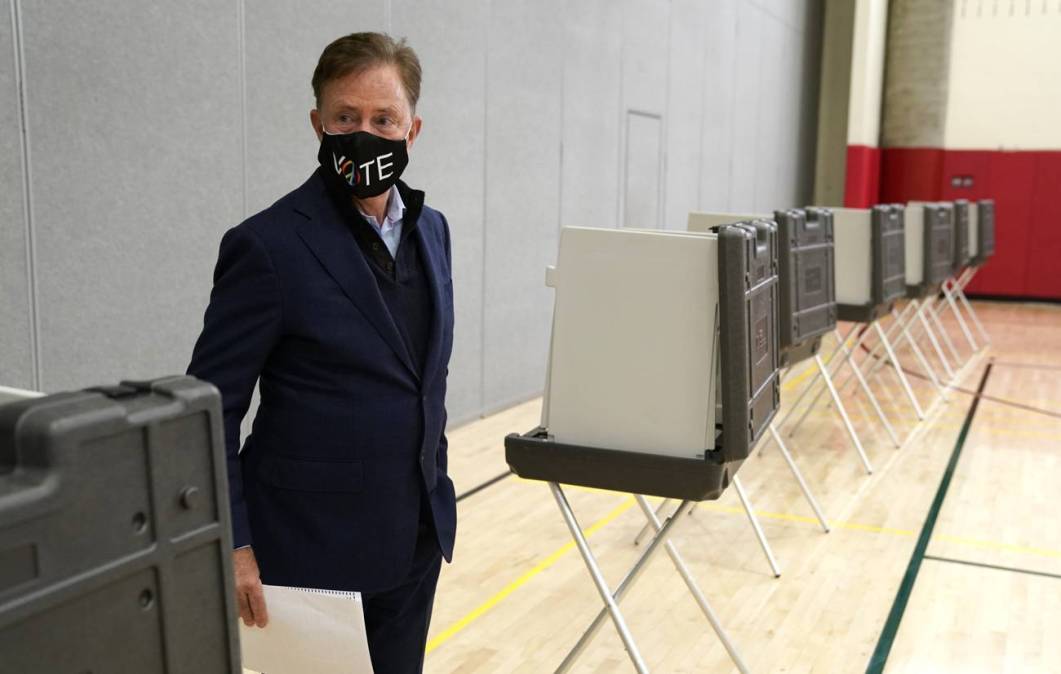Connecticut’s voter rights law, the strongest in the nation, finally got funded

Upon announcing this week that he’d signed into law a “balanced, sensible budget” for next two years, Connecticut Gov. Ned Lamont was also signaling that he’d authorized funding for the most comprehensive voting rights act in the nation.
The Connecticut Voting Rights Act, which became law in 2023 after the NAACP Legal Defense Fund introduced the legislation and accompanied it to enactment, had sat without funding until Monday. Now the act, which the civil rights group says needs roughly $1 million each year it operates, has the dollars it needs to implement its numerous protections, like legal tools to fight discriminatory voting rules in court, expanded language assistance for voters who struggle with English and a data portal to host all of the state’s election results and demographic information.
Christina Das, an attorney with the Legal Defense Fund who helped convince state lawmakers to approve the funding for this budget cycle, said it’s a welcome victory in a tumultuous era for voting rights.
“To have a funding fight like this be successful is really momentous right now because we are able to make sure that Connecticut voters and Black voters in Connecticut are protected for years to come,” Das said.
The Legal Defense Fund touts state voting rights acts, Connecticut’s especially, as a bulwark against interference from a president who has incessantly, since losing the 2020 election, made the unsupported claim that the race was rigged against him. And he has betrayed no compunctions about exacting revenge on anyone who opposes that narrative — he fired his Cybersecurity and Infrastructure Security Agency director, Christopher Krebs, after Krebs claimed that the 2020 election had been “the most secure in American history.” Four years later he stripped the former official of his security clearances, an act of retribution that appalled many, but also embodied the second Trump administration’s tightening grip on the levers of American democracy.
In Connecticut, Das said, funding the state’s voting rights act was eased by the fact that the bill had already been passed, but that competing against other valuable priorities during a lean economic period for states required a convincing argument. Her strategy revolved around emphasizing to lawmakers the savings the act would produce, such as how its data portal would obviate the need of election offices to fill repetitious public records requests.
The portal, which will be housed and operated by the University of Connecticut, will serve as “a one-stop shop and a bird’s eye view” for all of the state’s voting data, said Adam Lioz, the Legal Defense Fund’s senior policy counsel.
“[It’s] intended to bring together in one place all the information that voters need to understand how the elections are proceeding across the state,” Lioz said. “With a statewide database, all that information is at your fingertips and you can do an analysis of how things are going in the various cities and municipalities across Connecticut.”
For Lioz and his fellow civil rights advocates, the portal represents a fast track to identifying racial injustices. Where previously they had to submit public records requests to multiple agencies and conduct extensive analyses of the data to find indicators of potential race-based voter suppression or gerrymandering, a cache of shapefiles and other voting datasets will instead be automatically made public in one location, just as with a similar statewide database in California.
Trust in the integrity of democracy in the United States has been slipping for decades, but Connecticut’s data portal is also designed to build the public’s confidence. Trust in voting among Democrats has taken a particularly strong hit since Donald Trump took office in January. Going into the election, two-thirds of Democrats said they were very confident their votes would be counted correctly, a figure that fell to 55% after the election and slipped further to 45% last March, according to the States United Democracy Center, an elections advocacy group.
“If you have questions or doubts about election results or how things went, you can go to that one place, see how things played out, all the results will be there, all the demographic information will be there,” Lioz said of the upcoming portal. “You can engage with the database director and ask specific questions.”
Connecticut’s voting rights act also includes something called preclearance, a provision that requires regions with histories of racially discriminatory voting practices to submit all changes to their election laws for review before enacting them. Preclearance was a measure afforded nationwide, thanks to the federal Voting Rights Act, until 2013 when the Supreme Court paused that particular requirement. Das pointed to the erosion of such federal protections, along with ongoing redistricting battles in the courts, as further proof that state laws like Connecticut’s are needed to protect a class of voter that has faced nonstop challenges to exercising the right to vote.
Political intimidation, disinformation and other voter suppression efforts remain widespread, as do practical concerns related to voters finding transportation and obtaining identification. In Connecticut, Das said, a great number of voters can not reach a ballot box without facing at least one such barrier.
Even in friendly political climates it can be difficult to get voters to turn out, but in 2025, Trump has been removing much of the apparatus for safeguarding elections, including eliminating thousands of workers, at the FBI and CISA, tasked with reducing foreign interference and watching for disinformation campaigns.
Further complicating matters, The New York Times reported Wednesday, senior Justice Department officials are exploring the possibility of bringing criminal charges against state or election officials whom the administration deems to have not sufficiently protected their computer systems, a proposition that voting experts called alarming. Project 2025, the conservative blueprint that Trump has disavowed yet mimicked with curious precision, recommends just such a measure. (It also recommended scaling back CISA’s mandate.)
The new administration is also creating new systems and policies designed to clean states’ voter rolls of noncitizen voters, despite research showing that noncitizen voting is exceptionally rare. Last May, the U.S. Citizenship and Immigration Services announced that it had repurposed a federal database for verifying benefits eligibility for checking voter registration systems for noncitizens. Experts told CyberScoop they worried that inaccurate data spewed out by the hastily reconfigured system might be used to justify stricter federal actions related to voting or apply pressure on states to comply with White House demands.
Connecticut’s law might gain even greater significance if a nascent campaign succeeds in pushing through Congress the Safeguard American Voter Eligibility, or SAVE, Act, which would require people registering to vote to show proof of citizenship, an extra step that could potentially disenfranchise millions of eligible voters, such as married women who’ve changed their names. A campaign led by the Tea Party Patriots, a well-connected group with a record of mobilizing support behind conservative issues, will start in earnest next month, Democracy Docket reported Wednesday. In a recent planning session held over Zoom, the group outlined plans to convince senators to attach the SAVE Act to a piece of legislation that must be passed.
Threats to democracy abound. The Legal Defense Fund’s website says the Voting Rights Act, now almost 60 years old, is under attack, and so now “is Connecticut’s time to lead.” The group is especially proud of the Connecticut law’s provision for supporting people at voting locations who don’t speak English especially well. Das said there are 23 jurisdictions in Connecticut that meet the standard for language access outlined in the state act, but not the federal law.
“It really is a win not just for Connecticut, but for voting rights advocates nationwide,” she said, “because we really need help right now.”
Corrected July 4, 2025: This story previously stated that 60 jurisdictions in Connecticut meet the standard for language access under its new law, but the actual figure is 23. A statistic shared by Christina Das about the percentage of Connecticut residents facing barriers to voting was also corrected.






